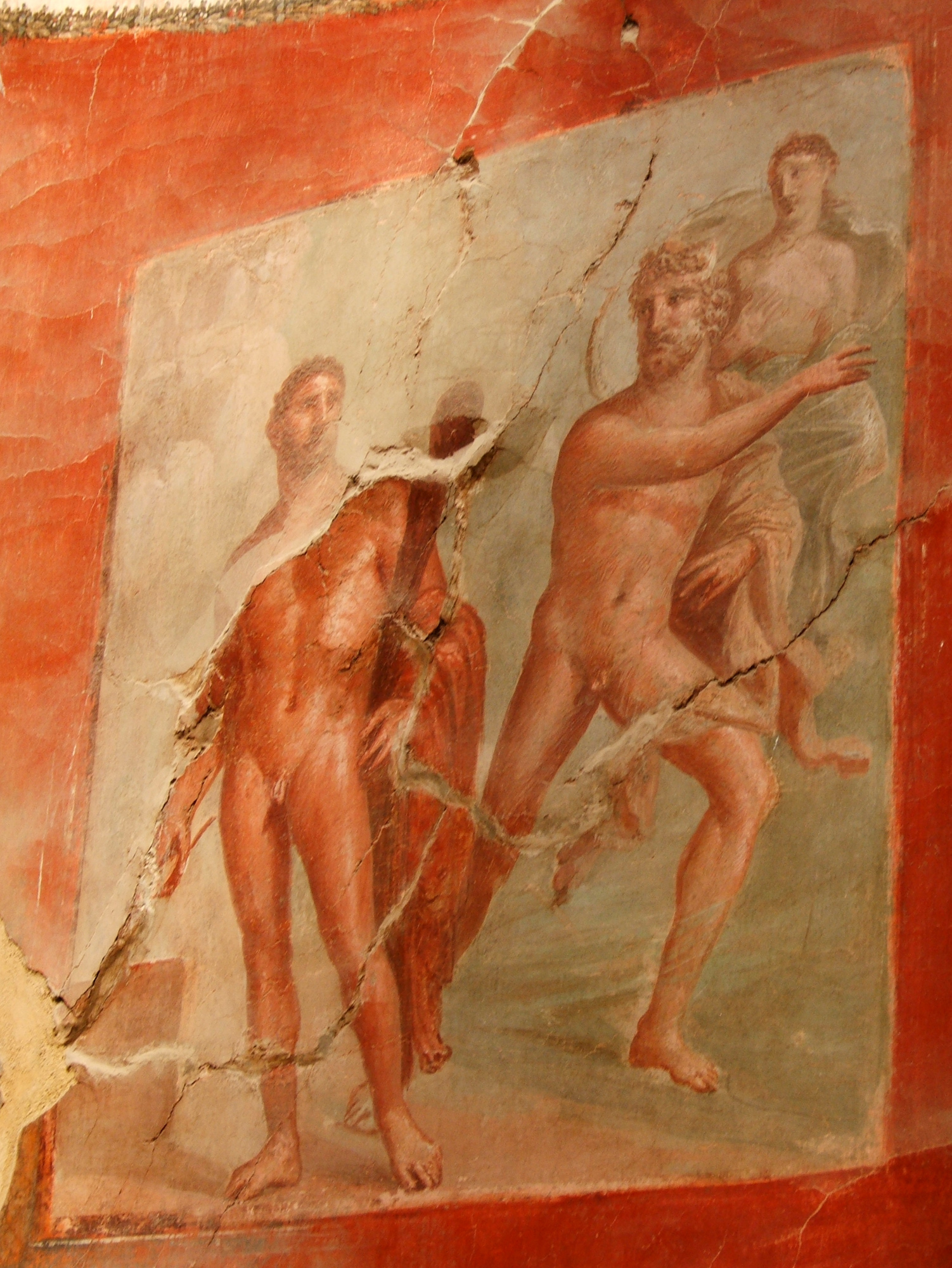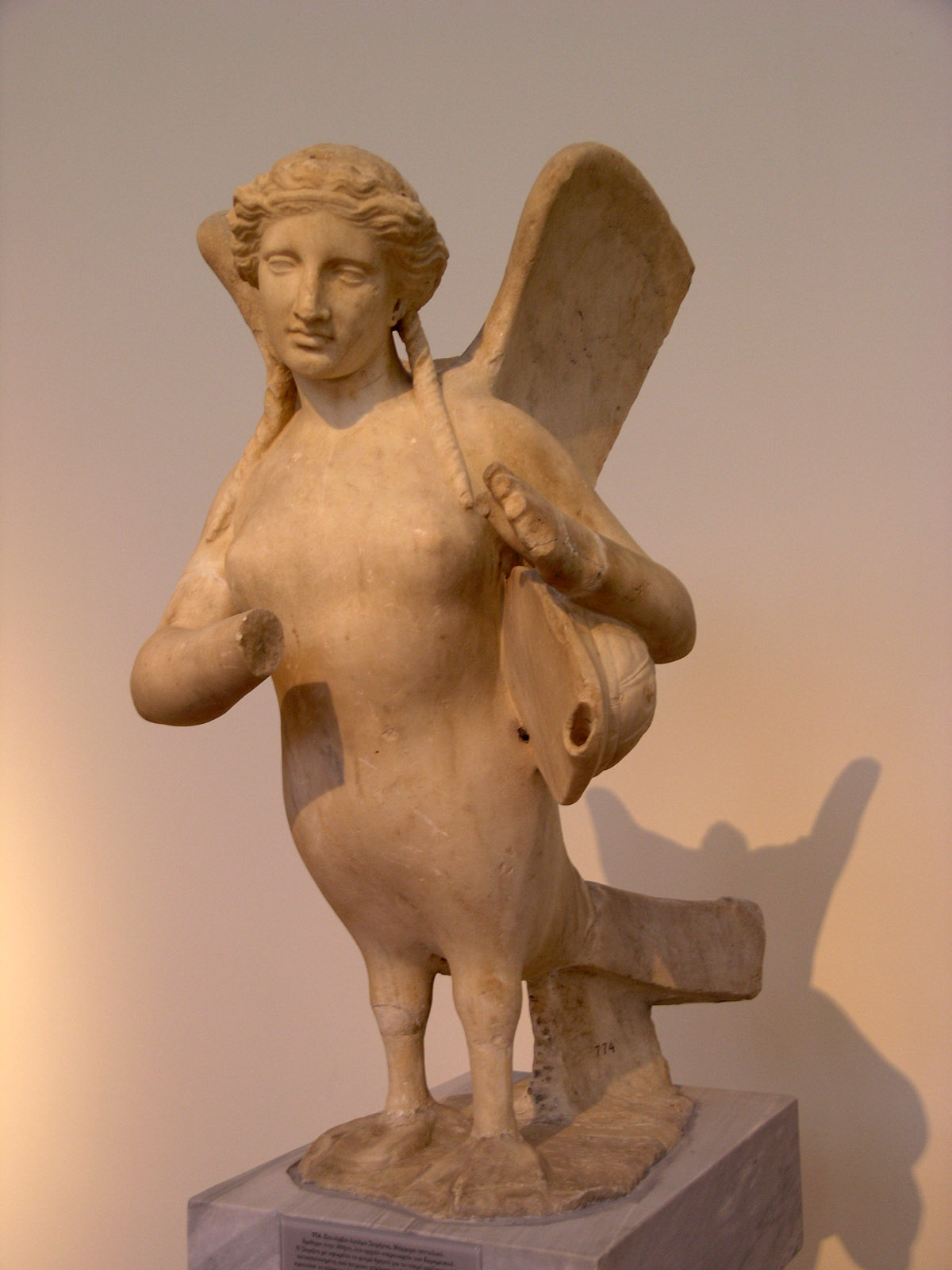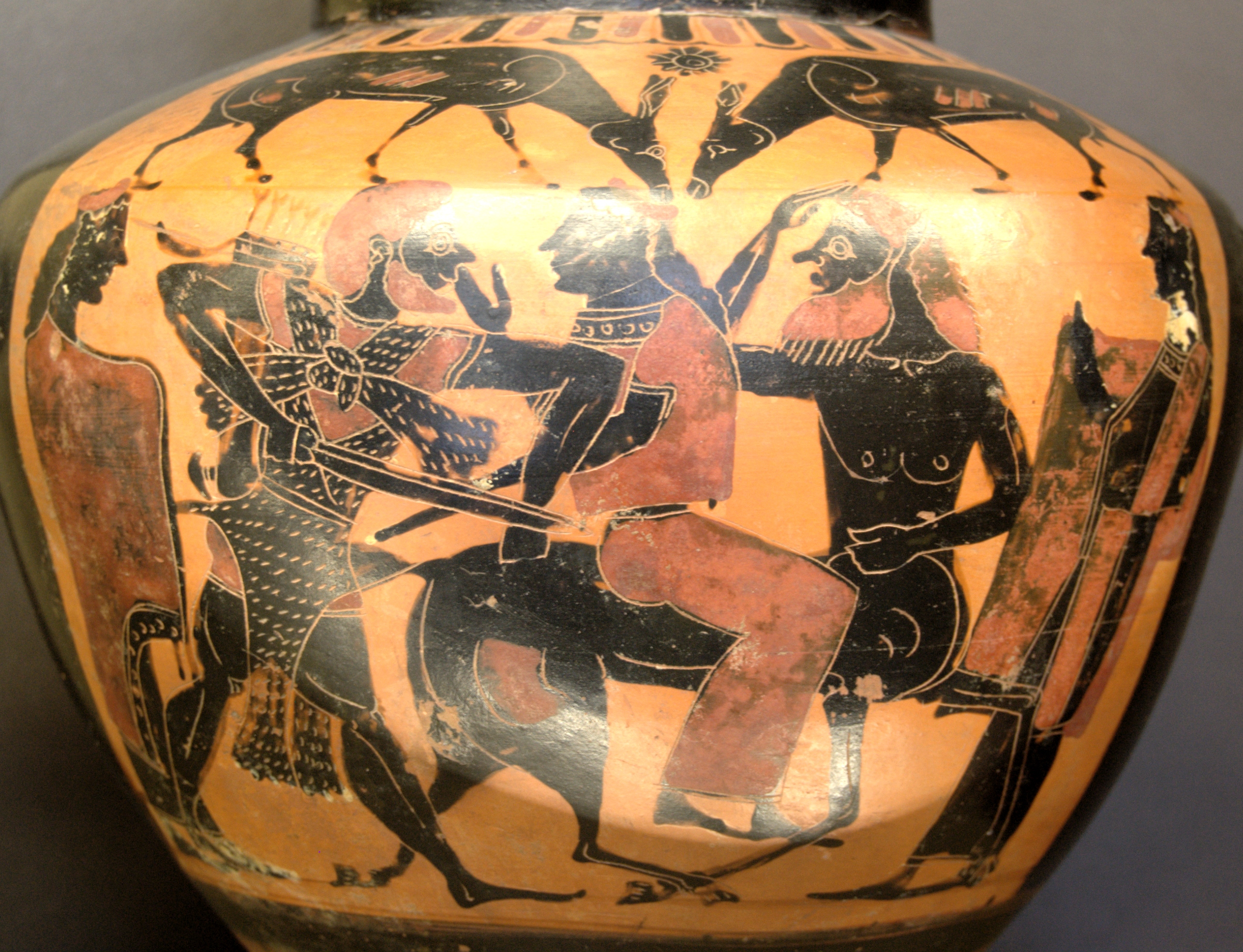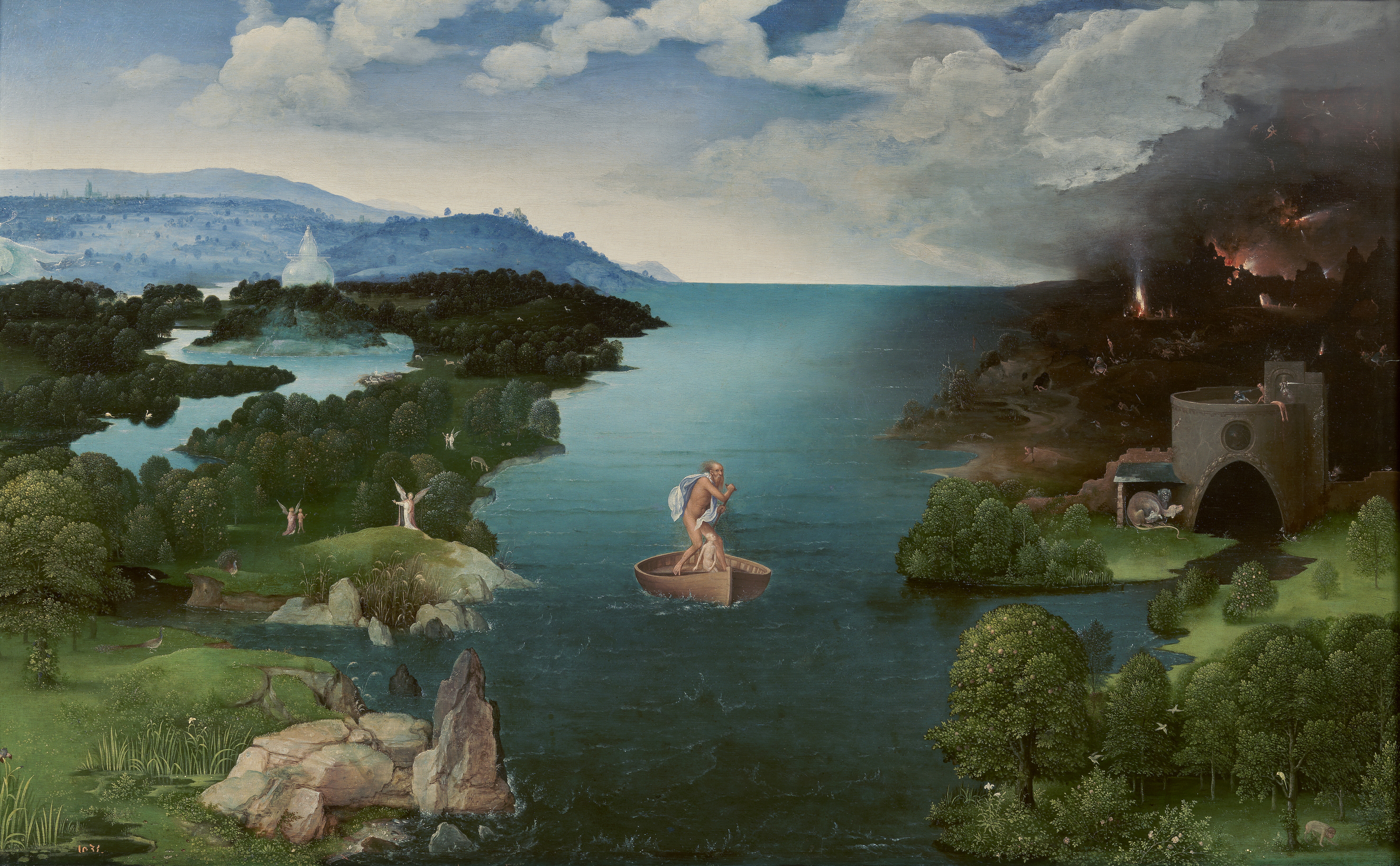|
Achelous
In ancient Greek religion and mythology, Achelous (also Acheloos or Acheloios) (; Ancient Greek: Ἀχελώϊος, and later , ''Akhelôios'') was the god associated with the Achelous River, the largest river in Greece. According to Hesiod, he was the son of the Titans Oceanus and Tethys. He was also said to be the father of the Sirens, several nymphs, and other offspring. Achelous was able to change his shape, and in the form of a bull, he wrestled Heracles for the right to marry Deianeira, but lost. He was also involved in the legend of the Argive hero Alcmaeon. Etymology The name Ἀχελώϊος is possibly pre-Greek, its meaning is not entirely certain. Recent arguments suggest it is Semitic in origin, with the initial Αχ- stemming from the Akkadian ''aḫu'' ("bank of the river"), or ''aḫû'' ("seashore") and the suffix -ελώἴος, from the Akkadian ''illu'' ("watercourse" or "water of the river invading land"). Exact match of the root ''achel-'' can be found ... [...More Info...] [...Related Items...] OR: [Wikipedia] [Google] [Baidu] |
Achelous River
The Achelous ( el, Αχελώος, grc, Ἀχελῷος ''Akhelôios''), also Acheloos, is a river in western Greece. It is long. It formed the boundary between Acarnania and Aetolia of antiquity. It empties into the Ionian Sea. In ancient times its spirit was venerated as the river god Achelous. Herodotus, taking notice of the shoreline-transforming power of the Acheloos River, even compared it to the Nile in this respect: :'There are other rivers as well which, though not as large as the Nile, have had substantial results. In particular (although I could name others), there is the Achelous, which flows through Acarnania into the sea and has already turned half the Echinades islands into mainland.' (2.10, trans. Waterfield) It is said to have been called more anciently ''Thoas'', ''Axenus'' and ''Thestius''. Course The river Achelous begins at about elevation on the eastern slope of Lakmos mountain in the Pindus range, near the village Anthousa in the westernmost part ... [...More Info...] [...Related Items...] OR: [Wikipedia] [Google] [Baidu] |
Siren (mythology)
In Greek mythology, the sirens (Ancient Greek: singular: ; plural: ) were humanlike beings with alluring voices; they appear in a scene in the Odyssey in which Odysseus saves his crew's lives. Roman poets placed them on some small islands called Sirenum scopuli. In some later, rationalized traditions, the literal geography of the "flowery" island of Anthemoessa, or Anthemusa, is fixed: sometimes on Cape Pelorum and at others in the islands known as the Sirenuse, near Paestum, or in Capreae. All such locations were surrounded by cliffs and rocks. Sirens continued to be used as a symbol for the dangerous temptation embodied by women regularly throughout Christian art of the medieval era. Nomenclature The etymology of the name is contested. Robert S. P. Beekes has suggested a Pre-Greek origin. Others connect the name to σειρά (''seirá'', "rope, cord") and εἴρω (''eírō'', "to tie, join, fasten"), resulting in the meaning "binder, entangler", i.e. one who binds ... [...More Info...] [...Related Items...] OR: [Wikipedia] [Google] [Baidu] |
Heracles
Heracles ( ; grc-gre, Ἡρακλῆς, , glory/fame of Hera), born Alcaeus (, ''Alkaios'') or Alcides (, ''Alkeidēs''), was a divine hero in Greek mythology, the son of Zeus and Alcmene, and the foster son of Amphitryon.By his adoptive descent through Amphitryon, Heracles receives the epithet Alcides, as "of the line of Alcaeus", father of Amphitryon. Amphitryon's own, mortal son was Iphicles. He was a great-grandson and half-brother (as they are both sired by the god Zeus) of Perseus, and similarly a half-brother of Dionysus. He was the greatest of the Greek heroes, the ancestor of royal clans who claimed to be Heracleidae (), and a champion of the Olympian order against chthonic monsters. In Rome and the modern West, he is known as Hercules, with whom the later Roman emperors, in particular Commodus and Maximian, often identified themselves. The Romans adopted the Greek version of his life and works essentially unchanged, but added anecdotal detail of their own, so ... [...More Info...] [...Related Items...] OR: [Wikipedia] [Google] [Baidu] |
Oceanus
In Greek mythology, Oceanus (; grc-gre, , Ancient Greek pronunciation: , also Ὠγενός , Ὤγενος , or Ὠγήν ) was a Titan son of Uranus and Gaia, the husband of his sister the Titan Tethys, and the father of the river gods and the Oceanids, as well as being the great river which encircled the entire world. Etymology According to M. L. West, the etymology of Oceanus is "obscure" and "cannot be explained from Greek". The use by Pherecydes of Syros of the form "Ogenos" (''Ὠγενός'') for the name lends support for the name being a loanword. However, according to West, no "very convincing" foreign models have been found. A Semitic derivation has been suggested by several scholars, while R. S. P. Beekes has suggested a loanword from the Aegean Pre-Greek non-Indo-European substrate. Nevertheless, Michael Janda sees possible Indo-European connections. Genealogy Oceanus was the eldest of the Titan offspring of Uranus (Sky) and Gaia (Earth). Hesiod lists hi ... [...More Info...] [...Related Items...] OR: [Wikipedia] [Google] [Baidu] |
Alcmaeon (mythology)
In Greek mythology, Alcmaeon (; Ancient Greek: Ἀλκμαίων ''Alkmaíōn''), as one of the Epigoni, was the leader of the Argives who attacked Thebes, taking the city in retaliation for the deaths of their fathers, the Seven against Thebes, who died while attempting the same thing. Family Alcmaeon was the son of Amphiaraus and Eriphyle and brother of Amphilochus. He had many progeny by different women including Clytius by Alphesiboea or Arsinoe, daughter of Phegeus; Amphoterus and Acarnan by Callirhoe, daughter of Achelous and lastly Amphilochus and Tisiphone by Manto, daughter of Tiresias. His son Clytius founded the Klytidiai, a clan of seers in Elis who interpreted the oracles of the Temple of Zeus at Olympia. Mythology The second Theban war Pindar's eighth Pythian ode relates a prophecy by Amphiaraus that the Epigoni will conquer Thebes, and that Alcmaeon will be the first through the gates. The mythographer Apollodorus, also states that the other Epigoni r ... [...More Info...] [...Related Items...] OR: [Wikipedia] [Google] [Baidu] |
Tethys (mythology)
In Greek mythology, Tethys (; grc, Τηθύς, Tēthýs) was a Titans, Titan daughter of Uranus (mythology), Uranus and Gaia (mythology), Gaia, a sister and wife of the Titan Oceanus, and the mother of the Potamoi, river gods and the Oceanids. Although Tethys had no active role in Greek mythology and no established cults, she was depicted in mosaics decorating baths, pools, and triclinium, triclinia in the Greek East, particularly in Antioch and its suburbs, either alone or with Oceanus. Genealogy Tethys was one of the Titan offspring of Uranus (Sky) and Gaia (Earth). Hesiod lists her Titan siblings as Oceanus, Coeus, Crius, Hyperion (mythology), Hyperion, Iapetus (mythology), Iapetus, Theia, Rhea (mythology), Rhea, Themis, Mnemosyne, Phoebe (mythology), Phoebe, and Cronus. Tethys married her brother Oceanus, an enormous river encircling the world, and was by him the mother of numerous sons (the Potamoi, river gods) and numerous daughters (the Oceanids). According to Hesiod, th ... [...More Info...] [...Related Items...] OR: [Wikipedia] [Google] [Baidu] |
Potamoi
The Potamoi ( grc-gre, Ποταμοί, "Rivers") are the gods of rivers and streams of the earth in Greek mythology. Mythology The river gods were the 3000 sons of the great earth-encircling river Oceanus and his wife Tethys and the brothers of the Oceanids. They were also the fathers of the Naiads. The river gods were depicted in one of three forms: a man-headed bull, a bull-headed man with the body of a serpent-like fish from the waist down, or as a reclining man with an arm resting upon an amphora jug pouring water. Notable river gods include: * Achelous, the god of the Achelous River, the largest river in Greece, who gave his daughter in marriage to Alcmaeon, and was defeated by Heracles in a wrestling contest for the right to marry Deianira. * Alpheus, who fell in love with the nymph Arethusa, pursuing her to Syracuse, where she was transformed into a spring by Artemis. * Asopus, father of many naiads. His daughter Aegina was carried off to the island Aegina by Zeus. A ... [...More Info...] [...Related Items...] OR: [Wikipedia] [Google] [Baidu] |
Deianeira
Deianira, Deïanira, or Deianeira (; Ancient Greek: Δηϊάνειρα, ''Dēiáneira'', or , ''Dēáneira'', ), also known as Dejanira, is a Calydonian princess in Greek mythology whose name translates as "man-destroyer" or "destroyer of her husband". She was the wife of Heracles and, in late Classical accounts, his unwitting murderer, killing him with the poisoned Shirt of Nessus. She is the main character in Sophocles' play ''Women of Trachis''. Family Deianira was the daughter of Althaea and her husband Oeneus (whose name means "wine-man"), the king of Calydon (after the wine-god gave the king the vine to cultivate), and the half-sister of Meleager. Her other siblings were Toxeus, Clymenus, Periphas, Agelaus (or Ageleus), Thyreus (or Phereus or Pheres), Gorge, Eurymede and Melanippe. In some accounts, Deianira was the daughter of King Dexamenus of Olenus and thus, sister to Eurypylus, Theronice and Theraephone. Others called this daughter of Dexamenus as Mnesimache or H ... [...More Info...] [...Related Items...] OR: [Wikipedia] [Google] [Baidu] |
Theogony
The ''Theogony'' (, , , i.e. "the genealogy or birth of the gods") is a poem by Hesiod (8th–7th century BC) describing the origins and genealogies of the Greek gods, composed . It is written in the Epic dialect of Ancient Greek and contains 1022 lines. Descriptions Hesiod's ''Theogony'' is a large-scale synthesis of a vast variety of local Greek traditions concerning the gods, organized as a narrative that tells how they came to be and how they established permanent control over the cosmos. It is the first known Greek mythical cosmogony. The initial state of the universe is chaos, a dark indefinite void considered a divine primordial condition from which everything else appeared. Theogonies are a part of Greek mythology which embodies the desire to articulate reality as a whole; this universalizing impulse was fundamental for the first later projects of speculative theorizing. Further, in the "Kings and Singers" passage (80–103) Hesiod appropriates to himself the authority u ... [...More Info...] [...Related Items...] OR: [Wikipedia] [Google] [Baidu] |
Metaphysics
Metaphysics is the branch of philosophy that studies the fundamental nature of reality, the first principles of being, identity and change, space and time, causality, necessity, and possibility. It includes questions about the nature of consciousness and the relationship between mind and matter, between substance and attribute, and between potentiality and actuality. The word "metaphysics" comes from two Greek words that, together, literally mean "after or behind or among he study ofthe natural". It has been suggested that the term might have been coined by a first century CE editor who assembled various small selections of Aristotle's works into the treatise we now know by the name ''Metaphysics'' (μετὰ τὰ φυσικά, ''meta ta physika'', 'after the ''Physics'' ', another of Aristotle's works). Metaphysics studies questions related to what it is for something to exist and what types of existence there are. Metaphysics seeks to answer, in an abstract and fu ... [...More Info...] [...Related Items...] OR: [Wikipedia] [Google] [Baidu] |
Styx
In Greek mythology, Styx (; grc, Στύξ ) is a river that forms the boundary between Earth (Gaia) and the Underworld. The rivers Acheron, Cocytus, Lethe, Phlegethon, and Styx all converge at the centre of the underworld on a great marsh, which sometimes is also called the Styx. According to Herodotus, the river Styx originates near Pheneus. Styx is also known as the goddess of the river, the source of its miraculous powers. Infernal river The deities of the Greek pantheon swore all their oaths upon the river Styx because, according to Greek mythology, during the Titanomachy, Styx, the goddess of the river, sided with Zeus. After the war, Zeus declared that every oath must be sworn upon her. Zeus swore to give Semele whatever she wanted and was then obliged to follow through when he realized to his horror that her request would lead to her death. Helios similarly promised his son Phaëton whatever he desired, also resulting in the boy's death. Myths related to such early dei ... [...More Info...] [...Related Items...] OR: [Wikipedia] [Google] [Baidu] |
Acusilaus
Acusilaus, Acusilas, or Akousilaos ( grc-gre, Ἀκουσίλαος) of Argos, son of Cabas or Scabras, was a Greek logographer and mythographer who lived in the latter half of the 6th century BC but whose work survives only in fragments and summaries of individual points. He is one of the authors (= ''FGrHist'' 2) whose fragments were collected in Felix Jacoby's ''Die Fragmente der griechischen Historiker''. Acusilaus was called the son of Cabras or Scabras, and it is not known whether he was of Peloponnesian or Boeotian Argos. Possibly there were two of the name. He is reckoned by some among the Seven Sages of Greece. According to the '' Suda'', Acusilaus wrote genealogies (c. 500 BC). Three books of his genealogies are quoted, which were for the most part only a translation of Hesiod into prose. Acusilaus claimed to have taken some of his information from bronze tablets discovered in his garden which were inscribed with information, a source looked upon with suspicion by ... [...More Info...] [...Related Items...] OR: [Wikipedia] [Google] [Baidu] |









